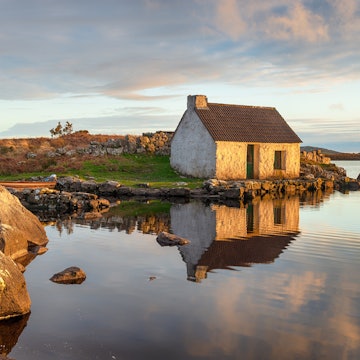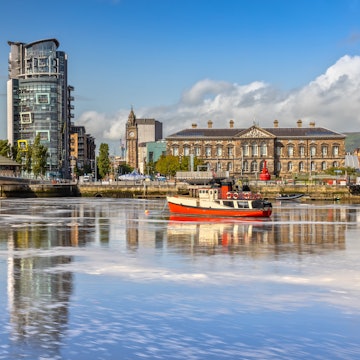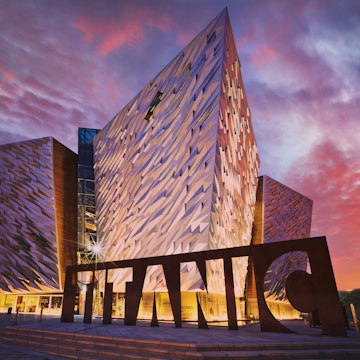

Sarah Arnold © Hunter Bros / Lonely Planet
Belfast and Northern Ireland were once synonymous with words like "terrorist attack" and "bombing" but it’s a completely different place today. It’s been over 25 years since the ceasefires and 22 since the Good Friday Agreement came into effect which, combined, brought peace to our little nation.
I didn’t grow up in Belfast but in the lake county of Fermanagh, about 80 miles west or "in the sticks" as Belfast natives often say. Instead, I moved there to attend university and have been a city resident for over 10 years. My first memories of the city were in the car with my parents in the '90s, and as soon as the motorway lanes went from two to three, one of them would ensure the car doors were locked. The city didn’t have a great reputation, even locally. But all that has changed and now Belfast is the city that’s behind Game of Thrones and its street art would rival that of anywhere else in the world. The creativity and arts sectors have transformed the city over the last two decades.
I should note that Belfast is a city of "quarters" including Cathedral Quarter, Linen Quarter, Queen’s Quarter, Titanic Quarter, Market Quarter and the Gaeltacht Quarter. It doesn’t take a mathematician to work out there’s more than four – and there’s much to visit in all of them.

Cathedral Quarter – Temple Bar with fewer people
Cathedral Quarter, aptly named after St Anne’s Cathedral, was once an area in which there wasn’t much to do; it wasn’t a vibrant part of town. Today, it’s the opposite of that. The cobbled streets and tiny walkways with fairy lights swinging between them are thriving due to an increased workforce in the area and the new University of Ulster campus.
The Duke of York, a pub with antique wooden furnishings and walls lined with Guinness paraphernalia would have you believe that it serves the finest in the country. That accolade is actually given to Robinsons, by the main bus and train station (a pint and a burger by its fireplace is a must in winter). The Duke of York was once an "old man’s pub" but is now a hive for post-work drinks, and you can sit outside in the alleyway to admire some of the finest street art in the city.
This art is not the murals that line sectarian interfaces but pieces that celebrate Northern Ireland. One such piece of art celebrates Northern Ireland's achievements in sport and television. Jamie Dornan is depicted in The Fall, there’s a scene from Game of Thrones and it wouldn’t be Northern Ireland if George Best didn’t appear somewhere. Along other streets are artworks depicting other matters, some lighthearted and others more serious, such as racism and poor working conditions.
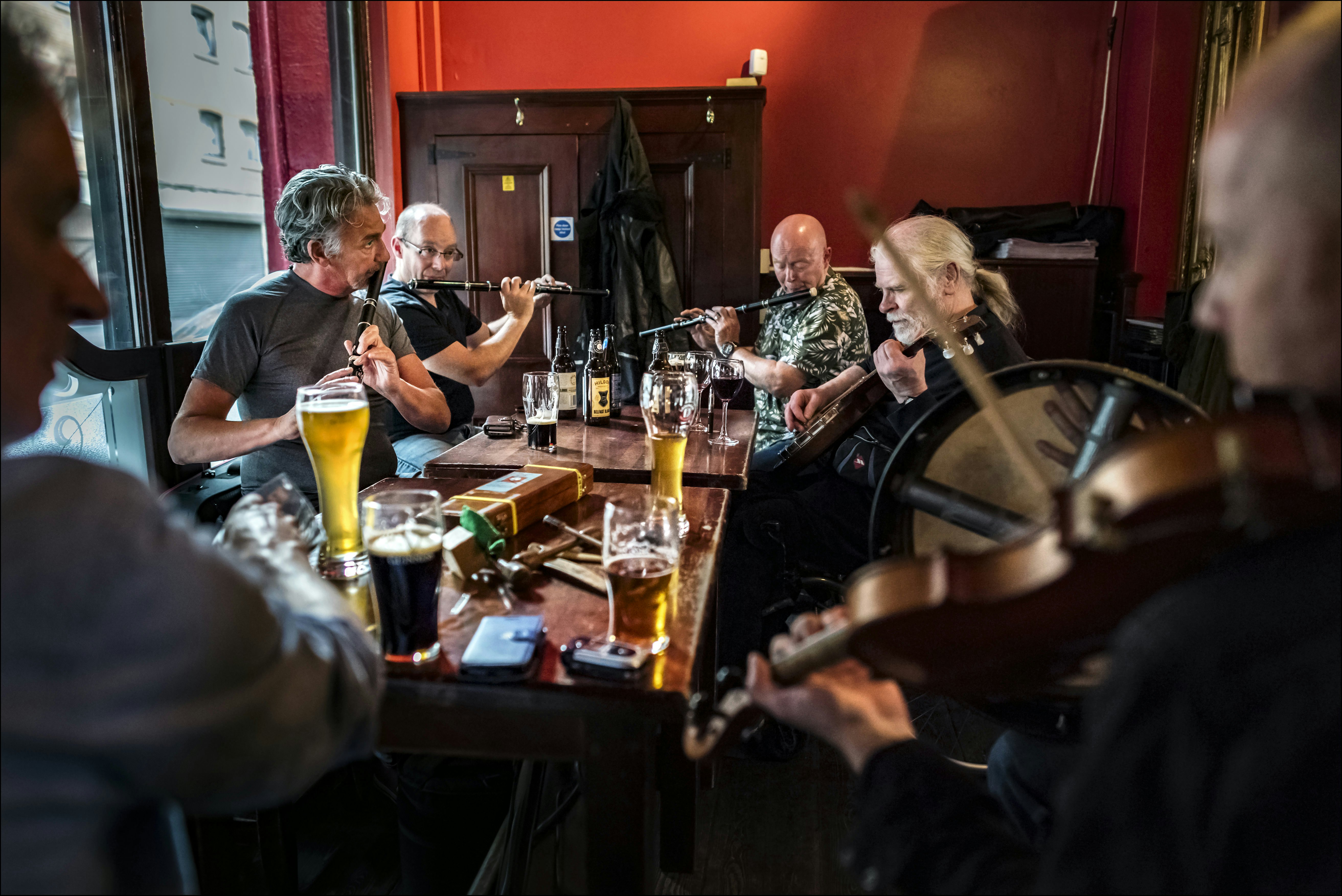
One of the treasures of this area is the Dirty Onion. On weekend nights, the popular bar is crammed with people but on Sundays there are traditional music sessions in front of their fireplace and they may be playing to only you. The bar supplies an array of local ales and Yard Bird upstairs has something for those needing an upgrade from Nando's. Nearby North Street is going through a transformation; part of it has recently been demolished but Belfast’s finest second-hand book shop, Keats & Chapman, remains. It has long been a lunchtime hideout for me; a place where I can find books on genres I never thought I cared about.
Established is the coffee shop for the area and it is a hipster’s paradise, but don’t let that intimidate you. The large table at the centre of the shop is where those with laptops congregate using the free wifi while sipping on coffee from a glass jug. On the periphery of the shop, people are catching up with those dear to them while munching on local traybakes. Nearby St Anne’s Square offers a wealth of eateries. One of my personal favorites is the two-course business lunch at House of Zen. The service is impeccable, portions are large and value for money is 10 out of 10.

Queen’s Quarter – a regenerated student area
A mile-and-a-half from St Anne's Square is Queen’s University. It was once an area where I raced between classes or stopped for frozen yogurt while simultaneously avoiding study. Completed in 1849, the central Lanyon Building, stands out among all others. Its Tudor and Gothic architecture was based on other UK universities and non-students can wander around the grounds to admire it.
This wander will inevitably lead into Belfast’s Botanical Gardens. It’s recently had its share of investment (£3.8 million) with the recently-reopened Tropical Ravine showcasing a unique collection of biodiversity in the Victorian building. It’s also a popular spot for students and workers to spend their off-time in the summer, eating ice cream and enjoying picnics.
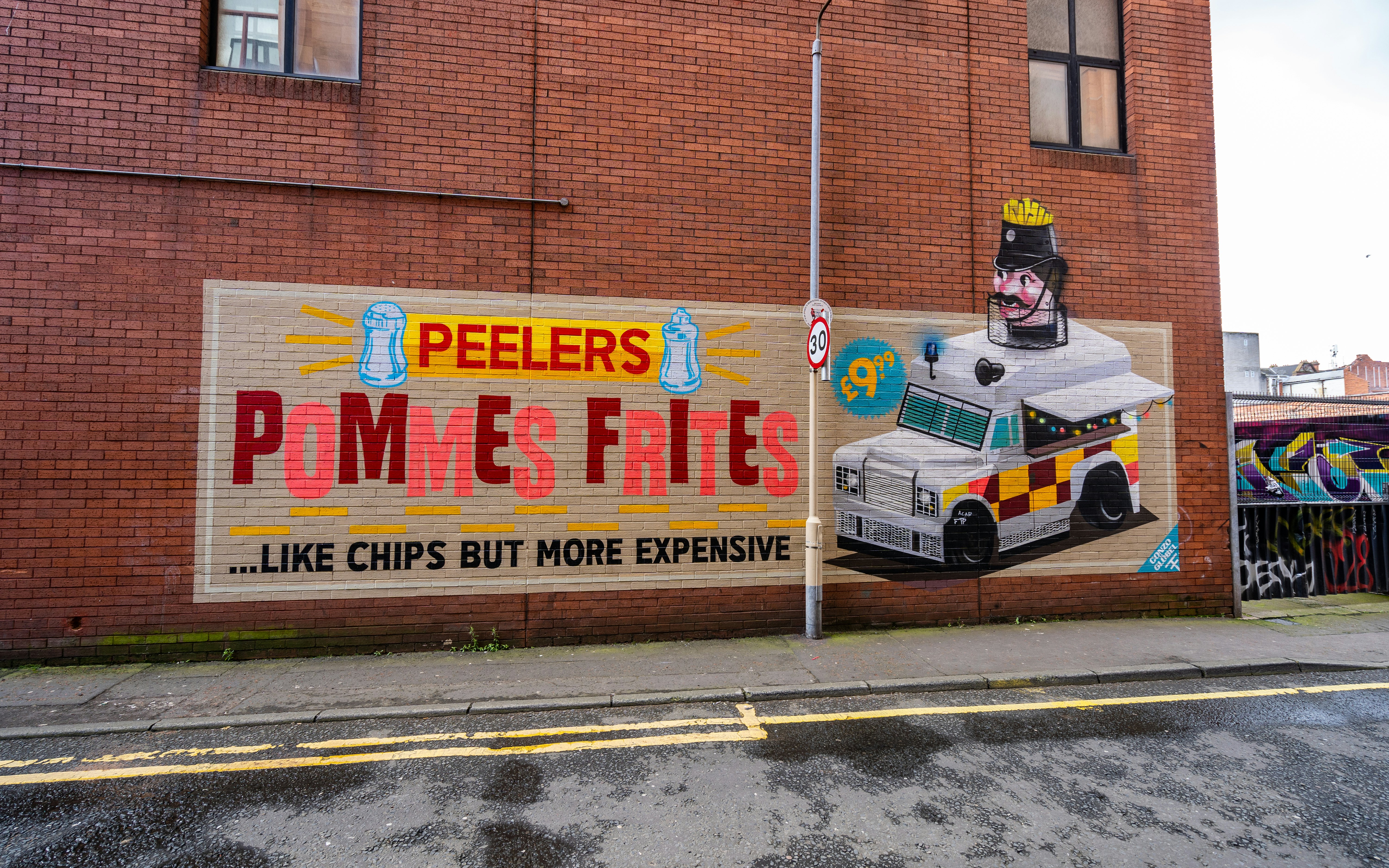
You can’t go hungry in this part of town; the student vibe ensures that high-quality food comes with a lower price tag. Across the road from the Ulster Museum (the go-to place for a history lesson on the province) is Café Conor with its high ceilings (it used to be a studio for local artist, William Conor). Have a hearty breakfast to prepare you for a day of walking through south Belfast.
Belfast’s best Italian is in this part of town. Villa Italia resides among university seminar rooms. I’ve enjoyed many celebratory meals here and, at one point, it was the only place I’d be happy to dine out at. Inside, you’re taken to Italy; the decor is Venetian and often there are queues of patrons waiting to eat. The quantity of food in each portion matches the quality here, and stone-baked pizzas and bowls brimming with pasta are aplenty.
Titanic Quarter: now the home of 'Game of Thrones'
With Belfast comes the memory of the doomed Titanic. Today, the people of Belfast own it and use it to their benefit. The city now has its own Titanic Quarter that’s built on reclaimed land. It’s a hub for creativity and tech start-up companies employing thousands of locals.
Outside of the museum Titanic Belfast, there’s so much more to see. An evening walk along the shoreline of the River Lagan reveals many lesser-known spots. You’ll walk by where they filmed Game of Thrones (and, if you look closely, you’ll see preparations for the prequel), Titanic’s Dock & Pump House and HMS Caroline, the last surviving ship from the WWI Battle of Jutland.

From many bedrooms at the Titanic Hotel, there are views across the Game of Thrones, Kings Landing set. This location was used throughout season eight, and the damage from the dragon is laid bare for passers-by to see. The hotel itself is a tribute to the Titanic, and it should be – it was previously the home of the drawing offices for Harland and Wolff, the company that built the infamous ship.
My favorite activity at the hotel is the afternoon tea – it is a real novelty. It’s enjoyed in one of the old presentation rooms but has views over what was previously one of the drawing rooms, which is now a bar. The majestic bar’s ceilings are three storeys high – they were unchanged in the transformation – and it was here that the Titanic was designed.
Belfast is a city with so much to give. In times when other UK cities were experiencing times of growth, the conflict in Belfast saw it lag behind. But now, thanks to big investments in all facets of the city, from the film and television sector to embracing and marketing the most famous ship of all, Belfast has, for the most part, made sure its historic issues are but a memory.
You might also like:
Quick escapes from Ireland's liveliest cities
Take a peek inside the Game of Thrones studio opening in February
Beyond the Giant's Causeway: exploring Northern Ireland's dramatic Causeway Coast















